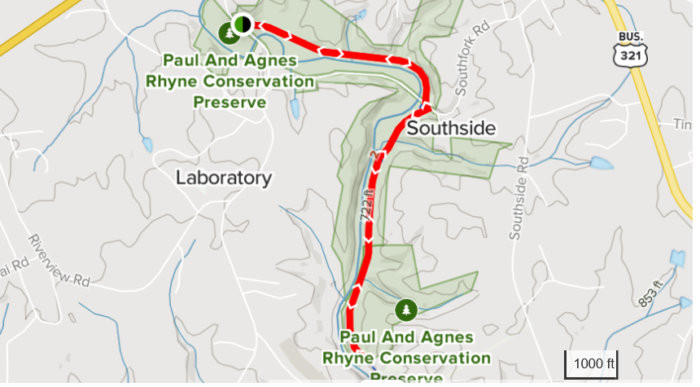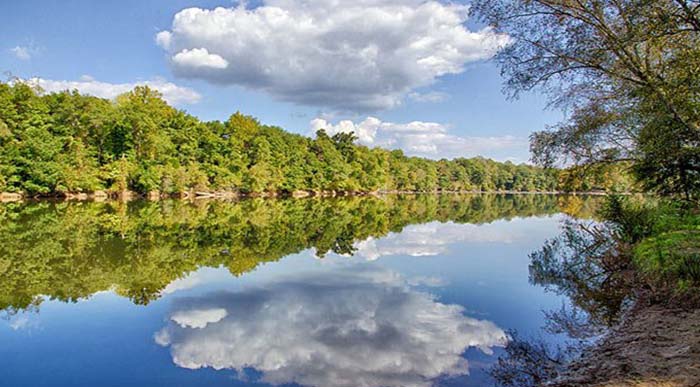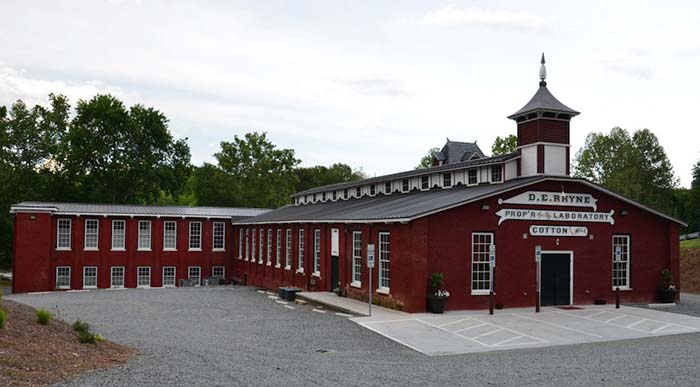Trail Ahead
With your New Year’s resolutions set, you may be looking for activities involving exercise and exploration. We’ve got you covered on both, at the same time. There’s the treadmill, there’s Pilates classes and then, there’s walking trails that lead to an old laboratory and abandoned cotton factory ruins. A day trip from Chatham County, you’re 2.5 hours away from an afternoon adventure like no other. Of all the reasons we love North Carolina, it’s diverse range of day trips tops the list; from mountains, to sea, to abandoned cotton factory ruins, all in the same day.
Are We There Yet?

A tricky spot to navigate on your own, the South Fork Rail Trail winds past an old railroad corridor, an old laboratory and abandoned cotton factory ruins. The 3.5-mile path outside of Lincolnton, North Carolina runs alongside a rail trail, with some of its original rails still in place. Where do you begin? Great question.
The Paul and Agnes Rhyne Conservation Preserve is home to the South Fork Rail Trail and many other mementos of North Carolina’s past. The South Fork Rail Trail is adjacent to the South Fork of the Catawba River, protected by the Catawba Lands Conservancy. Home to the Carolina Thread Trail, the trail combines a network of trails, blueways and conservation corridors, linking 15 counties across North Carolina and South Carolina. Over 250 miles of the Carolina Thread Trail are open for use, while the remaining sections are still under development. The South Fork Rail Trail, also a part of the Carolina Thread Trail, is open for business.
Trip Highlights

If you think you’ll be scaling mountains, dangling off cliffsides and shoulder-deep in mud, you’d be wrong. The South Fork Trail is made for bikers and hikers of all skill levels, composed of its natural surface and crushed gravel. Its difficulty rated as easy, you’ll be hiking 1.8 miles one way and 1.8 miles back the other way. Pets are allowed to join along, as long as they are leashed.
Trail goers will be immersed in Lincoln County’s natural features, including floodplain forests along the South Fork of the Catawba River, a bald cypress swamp, rock outcrops and wildflowers, depending on the time of year. You may encounter some of the area’s residents, like migratory songbirds and other wildlife species. For the grand finale, experience the historic Laboratory Mill, now operating as an event venue, but once known as the Lincolnton Cotton Factory.
Lincolnton Cotton Factory

Also known as the Lincolnton Factory, the Lincoln Cotton Factory officially opened in 1819. Three stories tall, boasting 3,000 spindles, original owners Col. John Hoke, Dr. James Bivings and Michael Schenck got the factory on its feet. In 1862, the factory burned down, possibly due to conflicts with the Civil War. During the Civil War, the army constructed the site of one of five laboratories on the grounds of the Lincoln Cotton Factory, working to produce drugs and medicines using the factory’s water power.
In 1887, the factory was restored to its original purpose, as a cotton mill, powered by water turbines instead of a traditional waterwheel. In 1916, the Great Flood struck western North Carolina, beginning with a category 3 hurricane that made landfall in Alabama. The Catawba River was not immune to the effects of the flooding, with water levels rising, most cotton mills were flooded along the river. The Lincoln Cotton Factory’s bridge was washed away and 3 feet of water flooded the lower level of the mill.
The mill operated until its closing in 1990s, becoming The Laboratory Mill, an event venue hosting weddings, business events and charitable functions. Now, as you walk along the South Fork River Trail, you’ll be well-versed on this landmark’s importance throughout North Carolina’s history. We’ll see you on the trail!
Tags: Bike, Biking, Carolina Thread Trail, Catawba River, Chatham County, Day Trip, Healthy, Hike, Hiking, Lincoln Cotton Factory, Lincoln County, Lincolnton, Lincolnton Factory, North Carolina, Paul and Agnes Rhyne Conservation Preserve, Pittsboro Day Trip, South Fork River Trail, The Laboratory Mill, Trail, Walking Trail

